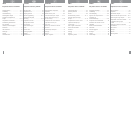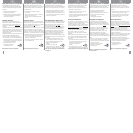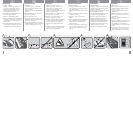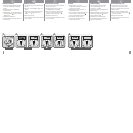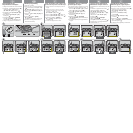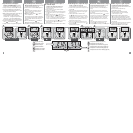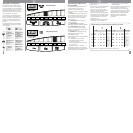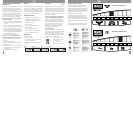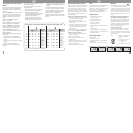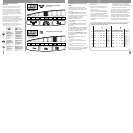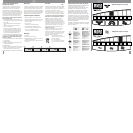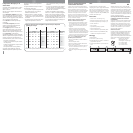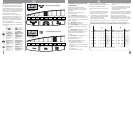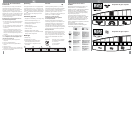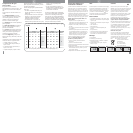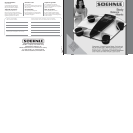
1918
1 2 3 4
Health experts recommend the following percentages of body fat/body water:
Body fat
Body
water
Body fat
Body
water
Age Excellent
++
Good
+
Average
•
High
–
Good
+
Exzellent
++
Good
+
Average
•
High
–
Good
+
20–24 18.2 22.0 25.0 29.6
50–55
10.8 14.9 19.0 23.3
60
25–29 18.9 22.1 25.4 29.8 12.8 16.5 20.3 24.3
30–34 19.7 22.7 26.4 30.5 14.5 18.0 21.5 25.2
35–39 21.0 24.0 27.7 31.5 16.1 19.3 22.6 26.1
40–44 22.6 25.6 29.3 32.8 17.5 20.5 23.6 26.9
45–49 24.3 27.3 30.9 34.1 18.6 21.5 24.5 27.6
50–59 26.6 29.7 33.1 36.2 19.8 22.7 25.6 28.7
> 60 27.4 30.7 34.0 37.3 50 20.2 23.7 26.2 29.3 50
The importance of water for your
health
The human body is about 55-60% water – the
amount varies according to age and gender.
Water performs a number of important roles in
the body:
Water is a constituent of our cells.This means
that all the cells in the body, whether in the
skin, glands, muscles, brain or anywhere else,
can only do their job if they have enough
water.
Water acts as a solvent of substances
important to the body.
Water is a carrier of nutrients, endogenous
substances and products of metabolism.
Water is a reactant in chemical reactions
involving or requiring water that take place
continuously in each of the body‘s cells.
Water is a coolant and plays a part in
regulating the temperature balance, particularly
through perspiration.
The percentage of body water decreases with
age. It can be:
75 to 80 per cent in newborn babies
about 60 per cent in adult men of normal
weight,
50 to 55 per cent in adult women of normal
weight,
about 50 per cent in older people.
Each of us loses a certain quantity of fluid
every day.
The quantity can vary considerably and it needs
to be regularly replaced.
Acute shortage of water can produce the
following symptoms:
Thirst, in the case of over 0.5 per cent of the
body weight (0.3 to 0.4 litres of water)
A decline in physical and mental
performance is apparent on losing as little as
2 per cent of body water, for example
through sweating or diarrhoea
A 3 per cent drop causes a decline in
production of saliva and urine, the mouth
becomes dry and constipation may occur
A greater loss of body water can lead to a
rapid pulse, increased body temperature and
confusion.
A healthy adult should normally drink about 2
litres of fluid. More fluid is needed in the case
of vigorous expenditure of energy, heat, cold
dry air, a high-salt diet, a high protein intake
and when unwell, for example high
temperature, vomiting, diarrhoea, etc. Always
consult your doctor in the case of fluid loss due
to illness.
Fluctuations can nevertheless occur (see page 19).
Factors influencing the results
Analysis is based on the measurement of the body's
electrical resistance. The water content in the lean
mass and the proportion of body fat and muscle
affect measurement results. Eating and drinking
habits during the course of the day and individual
lifestyle affect the water balance. This is noticeable
due to fluctuations in body water and body fat
percentage readings.
Other factors can affect water balance too:
After a bath, the body fat reading may be too low
and the body water reading too high.
After a meal, readings can be higher.
Women may experience fluctuations due to the
menstrual cycle.
Loss of water caused by illness or after physical
activity (sport). After exercise you should wait
6 to 8 hours before measuring your body fat
percentage again.
It is important to always to measure yourself under
the same conditions. Varying or implausible
results can occur in the case of:
•Persons with a high temperature, symptoms of
oedema or osteoporosis
•Persons on dialysis treatment
•Persons taking cardiovascular medicine
• Pregnant women
•Athletes who undertake more than 10 hours of
intensive training per week and have a resting
pulse rate of under 60/min
• Competitive athletes and body builders.
Note
The scale has an energy-saving mode that switches it
off automatically if no keys are pressed for
approximately 1 minute. To continue programming,
switch on the scale and keep pressing the
confirmation key ()until data previously input
appear.Then continue as described above.
Technical data:
Weighing capacity x graduation =
max. 150 kg x 100 g
Graduation: body fat: 0.1%
Graduation: body water: 0.1%
Height range: 100–250 cm
Age range: 10–99 years
4-person memory for individual specific data
storage
Large LCD display
Measuring current: 0.035 mA RMS, 50 kHz
Battery requirements: 4 1.5V Mignon AA (LR6)
(batteries are included)
Meaning of symbols
➀ Batteries spent.
➁ Overload: 150 kg or more
➂ Implausible analysis result – check individual
programming
➃ Bad foot contact – clean scale or wash feet
Warranty
Soehnle guarantees that all defects due to materials
or manufacturing faults will be remedied by
replacement or repair, free of charge, for a period of
3 years from the date of purchase. Please keep your
purchase receipt and the guarantee card in a safe
place. If you have any complaints, please return the
scale to your dealer with the guarantee card and
receipt.
This device is screened in accordance with
the applicable EC Directive 89/336/EEC.
Note: the display value may be affected by extreme
electromagnetic influences, e.g. when a radio is
operated in the immediate vicinity of the device.
The product can be used for its intended purpose
again when the interference disappears, but may
have to be switched on again first.
Correct battery disposal:
Batteries must not be disposed of as household
waste. The law requires that you, as consumer,
return the waste batteries either to public collection
points in your town or to any outlet selling batteries
of the same kind.
Note: Batteries containing pollutant
substances are marked as
follows:
Pb = Battery contains lead
Cd = Battery contains
cadmium
Hg = Battery contains mercury



